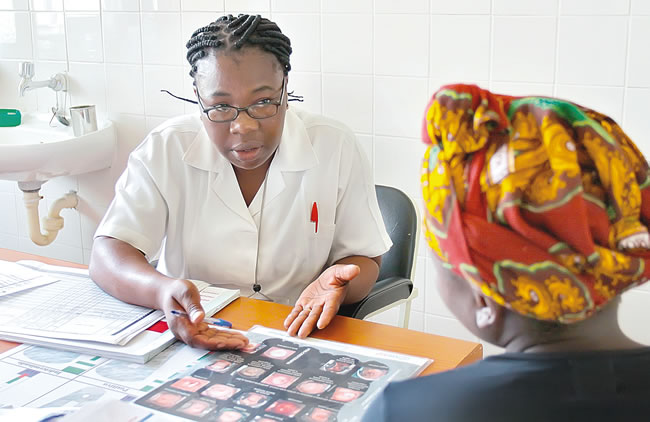Mrs Yinka Adesina, a newly-wedded lady never expected that she would need to get treated for abnormalities in her cervix, the entrance of her woman’s womb, to prevent future development of cervical cancer.
The doctor explained that she would require undergoing cryotherapy, a simple procedure to kill abnormal cells in the entrance of her womb. To ensure that the cervix heals well, after the treatment, she needed to abstain from sex for at least a month.
“Emotionally, I did not find it funny. The most terrible aspect of it was the “no sex for a month” though I just got married. After the treatment, I had to bear the heavy virginal discharge, including the accompanying odour,” Mrs Adesina, a 43 –year-old animal health technologist, recounted.
Mrs Adesina’s resolution to overcome the problem and her husband’s support pulled her through. Despite the setback, two years into the marriage, she gave birth to a set of twins, who are now 15 years-old. She had continued to have a yearly pap smear to be sure that her cervix remains healthy.
In Nigeria, cervical cancer is the second most common cancer in the country and in women, where it accounts for 21 per cent of all female malignancies in 2018, with estimated new cases of 14,943 according to the Global Cancer Observatory Population and Cancer fact sheets.
Cervical cancer screening is known to be highly effective in reducing the incidence, morbidity, and mortality associated with cervical cancer. However, the provision and availability of these screening services have not resulted in increased uptake of cervical cancer screening.
In Lagos, researchers put awareness and uptake of cervical cancer screening among women at 41.4% and 18.4%, respectively. It was at the Randle General Hospital, Lagos, Nigeria, between January 1, 2015, and March 30, 2015. It was in the 2020 edition of the Nigerian Journal of General Practitioners.
Uptake of cervical cancer screen was poor due to many factors, including lack of awareness of cervical cancer screening tests, not knowing where to do the test, non-recommendation by a doctor, the test is too expensive, and the test procedure is uncomfortable and embarrassing.
Others include discouragement by a spouse, fear of being diagnosed with cervical cancer, lack of adequate information, belief that ‘‘I cannot develop cervical cancer,’’ fear of the procedure, and indecision about doing a screening test.
Dr Olufemi Adesanya, a consultant obstetric and gynaecologist, said that it is a misconception that any abnormal screening result tantamount to the diagnosis of invasive cervical. Poor understanding of the process of the development of cervical cancer had caused this misconception in the community.
The expert, however, said positive support from family and friends can play an important role in facilitating the uptake of cervical cancer screening, particularly important in the African culture, where values are placed on close social and family relationships. Advice from such relationships can either positively or negatively influence the decision to undergo cervical cancer screening.
According to him, “Women’s perception about their susceptibility to develop cervical cancer has been shown to be an important factor that either motivates or hinders the likelihood of cervical screening uptake.”
Women who perceived that they are at increased risk of having cervical cancer are more likely to make themselves available for screening, while those that have misconception about their risk of having the disease are more likely not to undergo screening.
Howbeit, Dr Adesanya said the biggest challenge with cervical cancer is that it does not show any symptoms, especially in the early stages and as such the importance of regular screenings for cervical cancer. Regular screening test can help catch these asymptomatic cases at an early stage, and nine out of 10 cases of cervical cancer could be prevented.
Dr Adesanya declared that warning signs of cervical cancer include abnormal vaginal bleeding after menopause, in between menses and after sex; unusual vaginal discharge, loss of bladder control, pelvic pain, discomfort during urinating and unexplained weight loss.
Unfortunately, Chairperson, Collation against Cancer in Oyo State, Dr Omolara Olusola-Taiwo at the 2020 World Cancer day in Ibadan stated that cases of breast and cervical cancer were on the rise because “the health-seeking behaviour in Africa and Nigeria particularly is very poor. That is why we are here to tell them to examine their breast every month and go for regular cervical cancer screening.”
Nonetheless, Dr Funmi Salami, the Special Advisor to Governor Seyi Makinde on health, at the screening exercise for over 1000 women for breast and cervical cancer in commemorating the 2021 world Cancer day in Ibadan by the health ministry in collaboration with Oyo state Coalition against Cancer assured that the treatment for cervical cancer, when it is detected early, is relatively inexpensive and can safe life.
YOU SHOULD NOT MISS THESE HEADLINES FROM NIGERIAN TRIBUNE
We Have Not Had Water Supply In Months ― Abeokuta Residents
In spite of the huge investment in the water sector by the government and international organisations, water scarcity has grown to become a perennial nightmare for residents of Abeokuta, the Ogun State capital. This report x-rays the lives and experiences of residents in getting clean, potable and affordable water amidst the surge of COVID-19 cases in the state.
Selfies, video calls and Chinese documentaries: The things you’ll meet onboard Lagos-Ibadan train
The Lagos-Ibadan railway was inaugurated recently for a full paid operation by the Nigerian Railway Corporation after about a year of free test-run. Our reporter joined the train to and fro Lagos from Ibadan and tells his experience in this report…
ICYMI: Nigeria Back Into Recession, Worst Since 1987
Nigeria is back into a recession. This time, it is the worst the country has experienced since 1987…
ICYMI: Salami Panel Wants Magu, Other Policemen In EFCC Removed
President Muhammadu Buhari has received the report of the judicial commission of inquiry on the investigation of Ibrahim Magu, the suspended acting chairman of the Economic and Financial Crimes Commission (EFCC), headed by Justice Ayo Salami (retd)…
WATCH TOP VIDEOS FROM NIGERIAN TRIBUNE TV
- Let’s Talk About SELF-AWARENESS
- Is Your Confidence Mistaken for Pride? Let’s talk about it
- Is Etiquette About Perfection…Or Just Not Being Rude?
- Top Psychologist Reveal 3 Signs You’re Struggling With Imposter Syndrome
- Do You Pick Up Work-Related Calls at Midnight or Never? Let’s Talk About Boundaries







